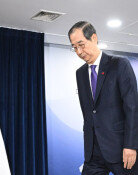Bond Market Seeing Biggest Boom in Decade
Bond Market Seeing Biggest Boom in Decade
Posted March. 13, 2010 09:50,
The domestic bond market is heating up, with nearly 20 percent in profit from bond investment possible due to the sharp decline in interest rates after a surge in the wake of the 2008 global financial crisis.
Money keeps flowing into the bond market amid uncertainty over economic recovery and greater volatility in riskier assets, including stocks. Certain experts say the bond market rally is the largest since the foreign exchange crisis of the late 1990s.
○ Bond yields higher than stock profit
After the Bank of Korea froze its benchmark interest rate Thursday, the yield on the Korean treasury bonds with a three-year maturity fell under four percent. Yesterday, the interest rate on the three-year corporate bond rated AA-minus also declined to 5.05 percent, the lowest level this year.
According to the Korea Exchange, the daily volume of bond transactions hit a record 12.37 trillion won (11 billion U.S. dollars) last month, and the rally has continued through this month.
After the global financial crisis broke out in September 2008, many companies floated bonds at high interest to raise cash. Interest rates have been falling since then amid brisk trading, so the yields on bond investment are skyrocketing.
This is the first time for bond interest rates to plunge so rapidly since the foreign exchange crisis, when corporate bond rates surged more than 30 percent before plummeting to seven to eight percent, said Choi Seok-won, head of the bond analysis team at Samsung Securities.
He said interest on bonds issued by AA rated companies tumbled to around five percent from more than nine percent right after the 2008 crisis, making yields of 18-19 percent on bond investments possible.
For instance, an investor who bought a three-year bond issued by Samsung Card in November 2008 at 8.3 percent and sold it at 4.4 percent yesterday saw an annual return of 13.62 percent. With interest rates on bank time deposits being four to five percent in November 2008, bond yields are about three times as high as deposit rates.
Domestic stock investment funds showing a return have fallen about four percent early this year, but bonds have earned nearly two percent in profits.
As investors flock to the bond market for higher returns, the increased demand is pushing down interest rates on bonds, allowing companies to float bonds at lower rates.
Unlike the second half of last year, bonds are becoming more attractive as safe assets amid reduced fears over an interest rate cut and signs of an economic slowdown, said Shin Dong-jun, head of the bond market team at the Korea Financial Investment Association.
○ Rate hike could end bond rally
With the central bank expected to increase its key interest rate, however, the biggest bond market rally in 10 years will likely end soon. Experts say a hike is inevitable as the economy is expected to rebound in the second half and advanced economies will likely prolong their looser monetary policies.
The bond rally is highly likely to end sooner or later because corporate bond yields have already fallen significantly and could rebound, said Samsungs Choi.
Hong Jeong-hye, an analyst at Shinyoung Securities, said, It remains to be seen whether the liquidity-driven rally will continue as banks are no longer selling high interest-rate deposits and time deposit rates are declining.
Current bond prices look too high to expect a continued rally.
Other analysts predict that the rally will likely continue for a while. Expecting interest rates to remain low until the end of the year, Yun Yeo-sam, an analyst at Daewoo Securities, said, The (bond) market will not likely turn bad because insurance companies and pension funds are likely to continue buying bonds.
redfoot@donga.com







